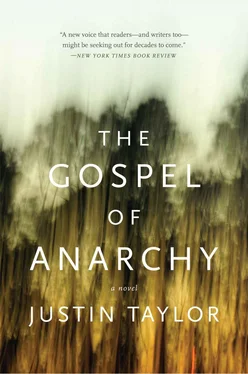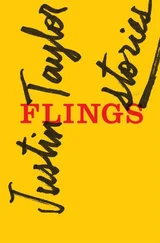Paolo brought his own tent and pitched it in the side yard — the other side — between the far end of the house and the chain-link fence, a weedy lane where nobody ever went. Paolo had a thick black head of hair spilling out from beneath a Florida Gators ballcap that might have been ironic, earnest, or just the first thing he’d grabbed. He was short, five three maybe, with a narrow, almost girlish waist, but there was nothing else feminine about him. He was fatless, compact rather than petite, and when he walked around with his shirt off (a nature kid, he usually did) it was impossible not to pause in whatever you were doing, swept up in gawking admiration of this specimen of optimum design. His body was hypnotic, his movements leopardlike, every muscle stood out in relief beneath his olive-gold skin. He could scramble ten feet straight up the trunk of a tree. Katy spent nights out in the tent with him, sometimes, but never did coax him into our room. Or maybe, I thought sometimes, she never tried.
Todd was an ecstasy freak who loved trancey jam bands. He rolled into town following the Disco Biscuits on their Southeast run, met Owl out in front of the library downtown, where they were both busking, and came back to the house with him so they could trade Dead tapes. He liked it at Fishgut so much he decided to skip the Tampa-Orlando-Miami leg of the tour, and we spent the next week so stoned we couldn’t speak — his pot had been dusted with something, but he never said what — and then one day some buddies of his came by in a beat-up station wagon with bug dots all over the windshield and a bumper sticker that said TREY IS A JEDI (we didn’t ask). He left, but took with him an entire box of Good Zines, and promised to distribute them over the next leg of the Biscuits’ tour: a three-night stand at a club in Athens, and then points north. He and his buddies had a little gas grill and were planning to pay their way selling grilled-cheese sandwiches (as well as a few sheets of acid) in the parking lots outside the shows. We reminded him the Zines were never — ever — to be sold, only given away freely. It was printed right there on the cover. Did he see? “Yeah, man, yeah,” he said. “I get it. I’ll give one away with every purchase — how’s that?” Good enough, or it would have to be. They left.
All these places, names of cities, train routes and state lines and destinations and rendezvouses. I didn’t believe in them. They explained the movements of bodies through space, sure, their passage in and out of view — Aaron gone, then an interval, then here again — but ultimately, what were they except useful fictions? Fishgut was what was real to me. The house was a planet, the city the solar system in which we spun. These people, travelers, always sounded so tiny when they described their movements across the country or the world, like grains of rice skittering in an oil drum. Those of us who stayed, who were the unwavering center, the rock-solid core of the house, saw that they suffered from a reversal of perspective, one that impeded their spiritual progress. The world was within us, every person a planet and the house the solar system, and the city — I don’t know, not the universe exactly; maybe Gainesville was the sun. Parker spoke of Gainesvilles flung out across the country like stars in the night, and what was the sun but a star? For us there was only here, plus wherever Parker was, which could have been anywhere and so was essentially nowhere. So there was Here and not-Here. And when he returned to us there would be Here alone.
Cassidy and Robot had been married in some sort of pagan ritual that the state didn’t recognize, which was fitting, they said, since they themselves did not recognize the state. They had a toddler with them, a bright-eyed and slightly underfed boy named Lincoln, for the place where he had been conceived, on the very day that the two had met at a Greyhound station. They had come down to Florida for a Rainbow Gathering, and had been wed in the forest, with the tree sprites and tripping hippies all bearing happy witness, but their ride had left without them and now they were adrift.
“You wouldn’t believe how hard it is hitching with three people,” Cassidy said. “If it was just me and the kid, it might be easy — people take pity on a woman in trouble. A single mom, you know. But with him”—she forked a thumb at Robot and clucked her tongue—“forget it.”
“You never gettin’ rid of me, baby,” Robot said to her, grinning. Cassidy grinned back at him. She was trying to fix her ratty hair up in a bun.
“Don’t I know it, baby?” she shot back, and then they both broke up laughing like this was just the funniest thing. Couples.
They were on opposite sides of the living room. It was late. Who knew what time, exactly, and what did it matter? We were working our way through the last of Todd’s parting gift to us — two blunts rolled with that mystery weed — and everyone was pretty much zonked. Katy was in her favorite chair, holding Lincoln and bouncing him on her lap. I was on my knees on the floor in front of the chair, eye level with the kid, making silly faces at him so he laughed and clapped his hands, each slap of his palms filling the air with showers of silver light like sparklers make. And the faces I made at Lincoln were making Katy laugh, too, and when she laughed I could see her aura brighten, and I wondered what she would look like if she laughed forever, which was an absurd thought, actually nightmarish in its way. Wasn’t there something neurotic about the entire concept of the eternal? This had never occurred to me before. The thought was a sudden alien, absurd, and far too much to wrap my head around; it spooked me badly, but then my perception of its absurdity began to seem like the thing that was truly absurd, and the meta-absurdity of that sort of shoved the absurdity proper out of the way, and in the course of think-watch-feeling all of this happen inside my head — while still, the whole time, goggling at the baby, to his continuing amusement — I realized that I was way more fucked-up than I had thought I was, and maybe shouldn’t actually be around a child — and I looked around the room and wondered who else this might be true of, umm everyone, and thought: who were all these people, these people who were us, who were sitting around pickled to the gills on whatever day of the week this was and why hadn’t we made sure the child got to bed on time — not that he or we had anything in particular to be up for the next day, but wasn’t there like a general idea out there that kids should get their rest? The breadth and depth of God’s trust in us seemed in this moment so vast as to be crushing, suffocating — or else, the more terrifying thought, it was entirely absent , there was no God and He had no trust to place in us, and we were just there, alone, fuck-ups and dropouts playing in the sandbox of our own tinfoil-hat ideas, while the kid’s parents had their bottom-shelf love affair and the kid himself was probably not getting enough vitamins or exercise, was going to grow up chunky, with short, weak bones.
The man who said, “Lord, make my faith stronger” was already a believer.
I had stopped making faces at the baby — moments or minutes ago, I had no idea. Hot, silent tears ran down my face, which Lincoln reached out to touch, and Katy no doubt assumed that these were tears of joy (I had become, in my advancing faith, rather prone to crying jags) so she held him forward so that he could. Small grubby fingers played across my wet cheeks, then down, where they found my beard and, fascinated, grasped then gave a little tug. “God is love,” I said, in a voice that sounded strange to my own ears. I sounded as if I were defending a position in an argument, rather than simply stating a fact. And I had shouted at the kid, who was staring at me in stunned silence, perhaps about to cry himself. I wriggled free of his little hand and stood up. My knees ached. How long had I been kneeling, frozen in the bodily grammar of supplication, the soul-seared plea? I walked out of the living room, reminding myself that we all experience paroxysms of doubt from time to time, and that the struggle to believe only made my faith stronger. Perhaps, at some level, if considered in this way, I had in fact been crying tears of joy.
Читать дальше












